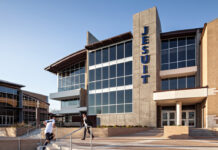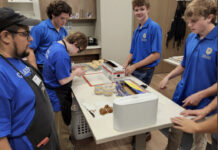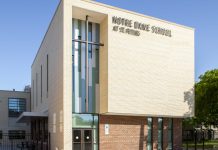For the students, it is untamed joy. For their teachers, it is needed relief. For the Jesuit senior, it’s simply another morning in the Ignatian Scholars Program.
As the 8:50 A.M bell rings, dismissing all underclassmen from homeroom to their next class, the seniors embark on quite a different journey. Every Wednesday, following a meeting in Hughes Hall, the men in black are off to their service sites.
For those forty-some seniors in the Ignatian Scholars Program, their day, which is spent at another school, is oddly similar to a day at Jesuit. But it is far from normal or boring.
Although most underclassmen have never heard of the program, it, like Jesuit, has an ample legacy. Over twenty years ago, the Great Books Program was founded by the Betty Walsh Foundation for the purpose of serving local parochial schools, educating their students and aiding their teachers. The program was assimilated into Jesuit about 8 years ago. According to Mr. Al Pierotti, the moderator of the Ignatian Scholars Program, who doubles as a senior English teacher, the school felt that it needed to fully “take the program under [its] wing”. Therefore, it is one of the better kept secrets at Jesuit, since it has only a handful of years directly linked to the school.
At Jesuit, the senior learns from his teachers, who aim to impart their knowledge onto their pupils. On Wednesday, the senior takes this experience and this knowledge and actually teaches younger kids. While some of the seniors help first-graders, others teach eighth-grade students, who are only a year from high school themselves. Although the age of the students that are taught varies greatly, the purpose remains the same, to give back to the community by not only educating, but mentoring its youngest members.
“Currently we work in eleven parochial schools in the diocese,” says Mrs. Danielle Bianchi, who will lead the program once Mr. Pierotti steps aside at the conclusion of the year. “The purpose is really two fold; from the perspective of our seniors, they get the chance to try some hands on teaching and tutoring experience with elementary and middle school kids. If they already have an interest in tutoring or possibly considering a teaching career, it’s a benefit to them to see if this is something they enjoy and certainly begin to develop those skills. From the perspective of the schools, they get the benefit of having the extra help. It helps to have our seniors there on Wednesday for some one-on-one tutoring time.”
An interest in teaching “is a plus, not a requirement.” Although about a quarter of participants in the Ignatian Scholars Program, known more commonly by its acronym, ISP, do decide to pursue a career in education, the program is really ideal for any senior that “is effective at communicating ideas and is open to growth.” The program is, in other words, hand-crafted for the typical high school Senior, who is on the cusp of matriculating from high school into college and is preparing to impact his world in a tangible way.
On Wednesday’s, the teacher steps aside. The senior has full control of the classroom. With younger kids, he might be instructing them on some basic math principles or fundamental reading skills, or even just bonding with them outside at recess. With older students, he might be analyzing more complex literature as in a high school classroom.
Many Seniors find assuming the role of a teacher, quite challenging. Many of them had not before “realized how hard teaching is,” reflects Mrs. Bianchi. But according to Marshall Huggins ’13, who is one of the many seniors that chose ISP as his service site, it is one of the most “enjoyable” things that he has ever done. While at first, he “didn’t expect much impact,” the ability to weekly work with second-graders, many of whom are struggling academically, and to see them grow is extremely “rewarding.”
“I really wanted to work with kids and to give back to Catholic schools.” Like many of the program’s participants, Marshall attended a parochial school before Jesuit, and felt the desire to give back to these schools, many of which do not have the accessibility to the same resources as other schools do. A large majority of the parochial schools that are involved in the program are located in lower socioeconomic areas; a large majority of the students, if not for the weekly interaction with the seniors, would never have the same level of personal academic attention.
“It’s a community service site for a reason,” admits Huggins. “We are helping out schools that need our help.” Otherwise, if the schools were as well-off as others, there would be no need for the seniors to be present.
On a purely tangible level, their presence is not necessarily essential, given that the students do have a full-time teacher with them; but their presence is completely necessitated on a more emotional level, as the seniors serve not only as teachers, but as role models for their kids. Over the year, Huggins has experienced growth within himself as well, developing his teaching skills so that he is “at [his] best teaching-wise”, as he has been all year.
Unlike Meals-On-Wheels, for example, where the impact that the seniors make is “immediate,” providing a basic life necessity such as food for the beneficiaries, the impact that the seniors make in the ISP is “more gradual.”
In a single day, no life-bearing necessity like food is bestowed. But over time, the senior, cuddled with his circle of students, provides perhaps a far greater need. With just the basics, people can still be un-happy. But the ISP Senior, supplies the group with the all important feeling of appreciation and the reassurance of being loved, which is also a trademark of the Jesuit education.
“It has been most telling during site visits to see the appreciation from principals, teachers, and students, who have someone to look up to,” says Mrs. Bianchi, much like a youthful boy looks up to his older brother with respect and admiration. The students have someone to imitate, someone who they can aspire to be like.
Huggins explains, “You get attached to the kids and you build relationships with the kids and teachers which is kind of what service is about, being men or women for others, building relationships with others, being really mentally involved in what you’re doing, not just doing through the motions. It really helps out the schools and the community as a whole, so I think ISP has definitely furthered Jesuit’s mission of being Men for Others.”
The mission of Jesuit: to offer “young men an excellent, Catholic education in the classical Jesuit tradition with the purpose of forming a community of men with high moral principles and service to others.”
The mission of the ISP: to offer parochial students an education from Jesuit students with the purpose of forming a community between the school, the teacher, and the student.
Sound similar?
Says Mr. Pierotti; “It’s a win-win situation for everybody.”
Out on the range, where the dry tumbleweeds bounce on by across endless acres of sandy land, many challenges exist. Out on the range, where the students are exposed to their arid environment, many challenges exist. Jesuit students seek to combat these parchments by cultivating the minds and hearts of these youngest, the students in the desert. The two, the Jesuit Senior and the student, stick to each other, clutching each other’s heart, bettering each other in the process. Here is the penultimate of success; although the arid desert can never be fully watered and quenched, the intimate, personal help that the seniors provide to their students nurtures an expansionary oasis. Soon, the kids that they help will be grown; soon, because of the help that they’ve received, they too can look to give back to their community, serving as did a few men in black on Wednesdays throughout the year.






